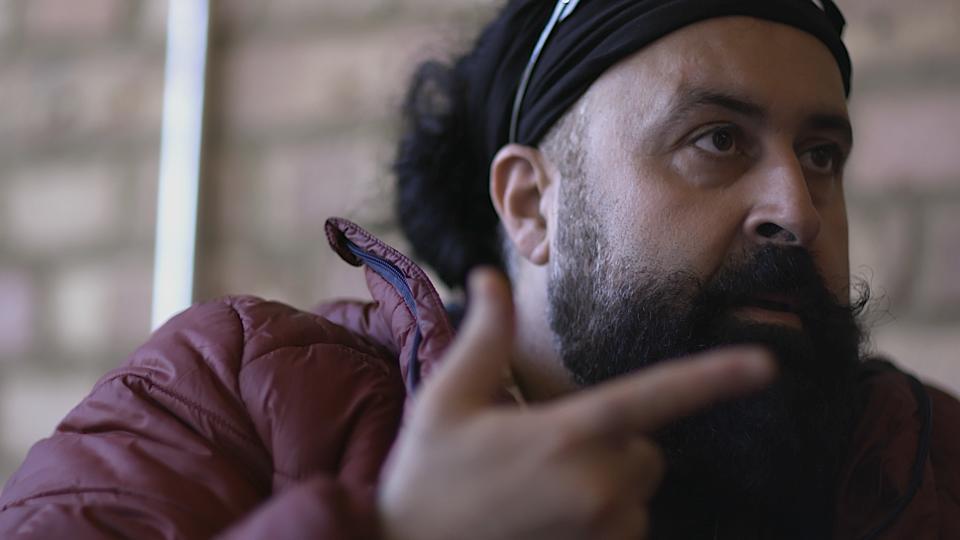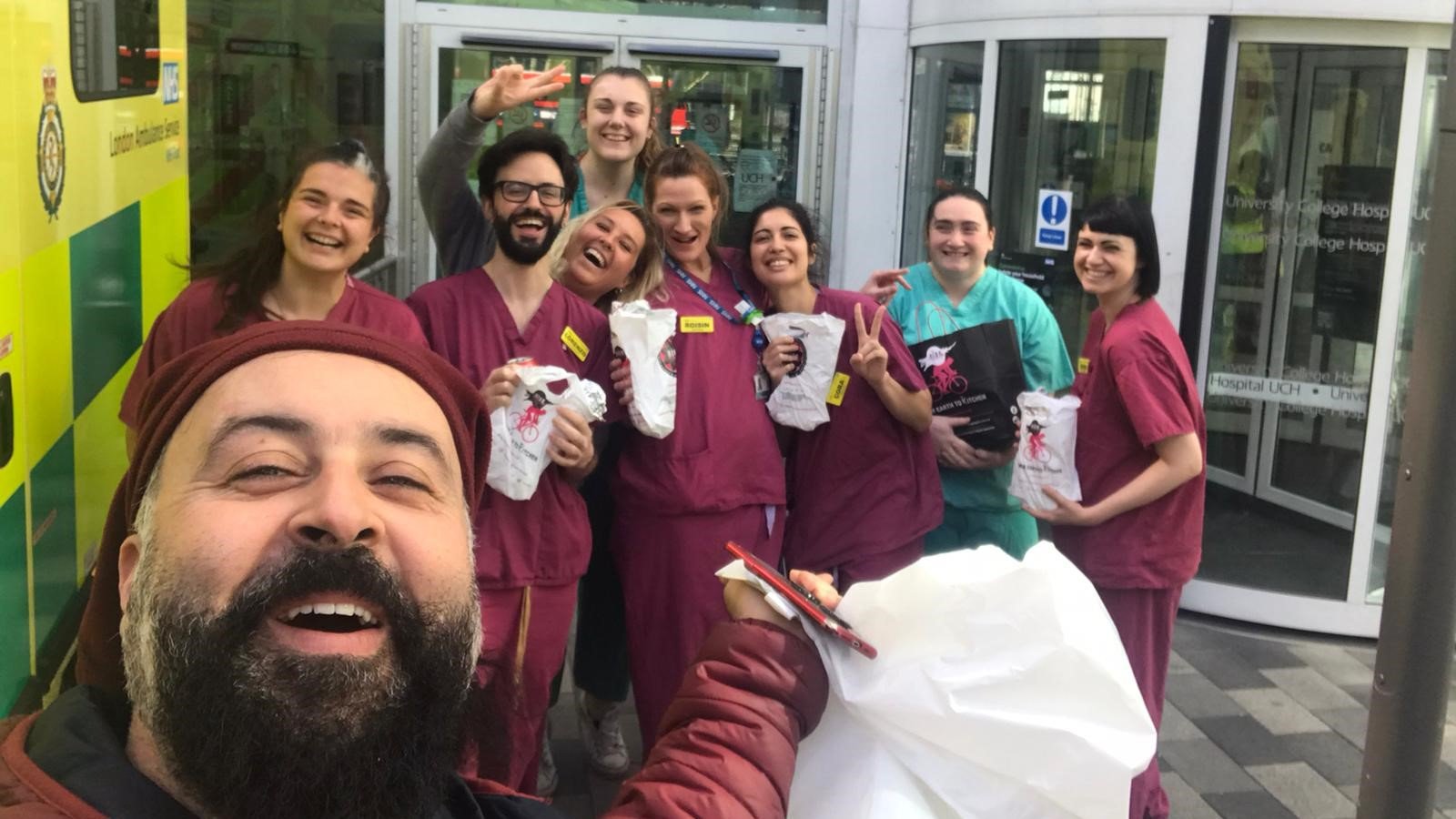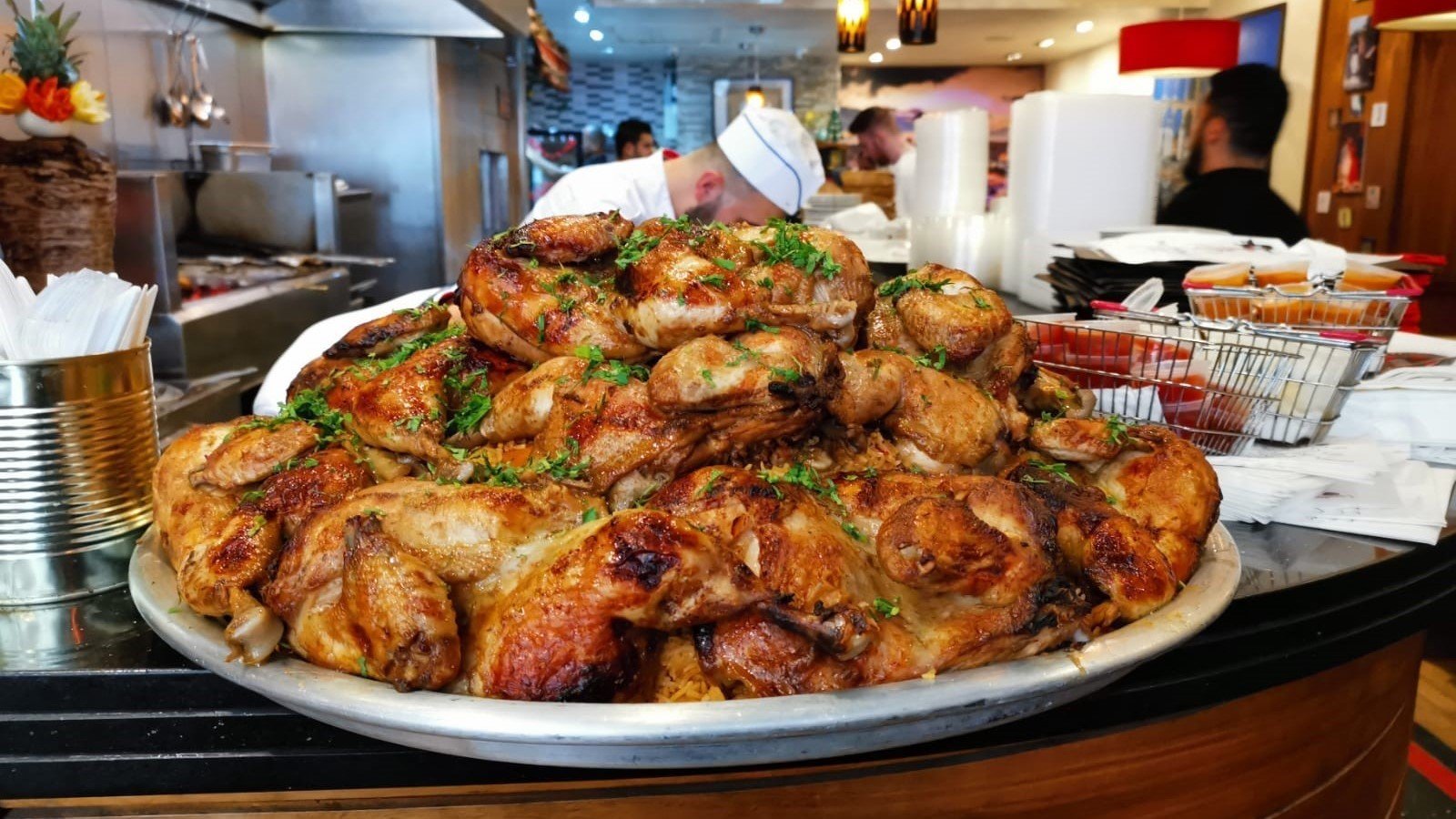Osama Qashoo oversees Hiba Express, a London chain of Lebanese and Palestinian restaurants with branches in Holborn, Goodge Street and Walthamstow. Originally a filmmaker, he turned his hand from films to falafels when he arrived in the UK from Palestine in 2005, building a menu of Middle Eastern favourites such as houmous and shawarma using tried-and-tested family recipes.
I had the chance to talk to Osama about how Hiba has navigated the challenges of the pandemic, the barriers faced by smaller hospitality businesses in the UK and what he thinks the future will look like, for the sector and for society as a whole.

Osama Qashoo, filmmaker and restaurateur.
Sarah Abu-Amero: Thank you for agreeing to talk to me today. Can you tell me about Hiba, then and now?
Osama Qashoo: Hiba was created out of a lack of money from filmmaking. Falafels are, sadly, more profitable than films.
We were thinking to make a business like a river that flows and shares, not a dam that collects. This approach helped us navigate through the new routes we had to take when we faced coronavirus in March 2020.
Now I’m trying to think about what I’m trying to achieve by the end of the pandemic- which is hopefully “we made it”. It’s not easy to ‘make it’. If we make it, the main reason behind us making it is that we didn’t just collect, we shared.
S: How has that emphasis on sharing helped you navigate the pandemic?
O: We’ve been a community from the beginning. We’ve been conducting our relationships in a family way. It’s not easy to look at and it’s not easy to understand, but that’s the dynamic of a family, whether it’s Danish or Swedish or English or Palestinian or Italian. The dynamic of a family is not easy, but it survives.
Those that supported us during COVID were small suppliers like us. We know their wives, their kids, their names. They’d bring us three, four, five, six weeks of products. We say in Arabic that the river needs a source of water. That doesn’t come from a dam. The local small businesses, we know how to have solidarity and empathy towards each other.
We managed to give away over 3200 free meals and we didn’t throw any food away. Our suppliers, when they knew what we were doing, they’d chip in with a little extra food.

During the pandemic, Hiba visited hospitals all over the city to surprise NHS staff with free meals.
S: How have consumer habits changed during the pandemic, and with the growth of delivery?
O: Buying habits changed, and they’ve changed forever. The customer cares about their food. If there are problems, they don’t realise there’s someone else who shares that responsibility. Your restaurant takes the blame for lateness or cold food. It’s automatic: customers talk to the [delivery] app, you make a loss. It’s hard to prove to the delivery company if you’re in the right.
There’s no 'click and eat' unless you get processed food. [Reheating food is] not healthy. Not fresh. That’s fast eating over healthy eating. It’s not even fast food. Fast food is, like, you stand for five minutes, get food and go. Now they want fast with fast delivery. People are now trying to understand, how do you make a burger in a second so we can deliver it in a minute?
S: What are the challenges for the hospitality industry, particularly smaller businesses?
O: The industry can’t sustain itself, if, after Brexit, stock prices go up, the Pound goes down, there aren’t enough [staff] to employ, people don’t want to work in the industry anymore. The system now is totally unsustainable for local businesses. The platform is vanishing. Being hit with Brexit, the lower value of the Pound, and then COVID? It’s crazy.
All of the loans they’re offering to businesses? There’s no way you’ll be able to pay those loans. You’d restart your business in debt. For me now, the biggest challenge is, you’re going to restart and have half a million worth of debt. You can’t restart. My English isn’t good but isn’t 'restarting' starting again? From zero? You can’t restart from minus half a million. If you want to be able to call it a restart, you’d have to reset to zero and truly start again. Landlords want their money on the dot, plus interest, which they added when we couldn’t make rent.
COVID was proof that big corporations impact our community. You need to invest in your local businesses because the money that you spend there will come back to you. If you buy your food from me, I’ll do my laundry at your laundrette, you’ll cut my hair, you know? If I’m gonna buy it from [a large corporation] it’s not coming back to my local business and in central London that is even harder.
S: What do you think will happen in the future, as we move out of the pandemic?
O: It’ll take some time, but people will realise that there’s more to life than money. You don’t go to work just because you make money. The value of your happiness is more than money or what you do. Maybe that’s idealistic, but it would make us a community. More local than global. More pennies than pounds. More vulnerable than strong. More being resourceful than having resources. We need a system, but the system has to be inclusive, not exclusive. The system has to be empathetic.
It’s unfair, there’s no question. When businesses are hit hard, the smaller ones vanish. ‘Bouncing back’ is like a trampoline. It has to be a real bounce back.
S: What would a 'real' bounce back be?
O: Scrap all the debts and restart. That’s bouncing back. If you fell off a trampoline and hurt your knee, your mum wouldn’t throw you straight back onto the trampoline. She’d comfort you, maybe take you to hospital, then send you back. But the reason we fell off in the first place is that the trampoline was broken. If I try and bounce back, I’ll only fall off and hurt myself again.

Maqluba, a special at Hiba Express.
S: I apologise for the sharp change in tone, but what’s your favourite dish?
O: My favourite dish? From my restaurant? Sushi. (laughs) I love food. I eat everything. My favourite is maqluba [a Palestinian rice dish where ingredients are layered in a pot and cooked, then turned out upside-down onto a plate to serve].
S: Why?
O: It’s very reflective of our reality. It’s upside down.
Hiba Express now operates five locations across Holborn, Goodge Street and Walthamstow. Visit their website at https://www.hiba-express.co.uk/. They can also be found on Facebook and Instagram @hibaexpress.

 901
901
901
901


